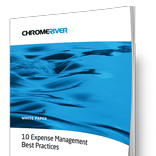
Reimbursing employees for expenses is already complicated — especially if you’re processing the expense reports manually. Keeping your expense policy in compliance with all laws adds an additional layer of complexity. Effective expense management provides managers with greater visibility into spending, minimizing such risks as lack of compliance with statutory requirements.
According to an article on the CEB blog, a continuing legal education resource co-sponsored by the State Bar of California, complying with legal requirements can be particularly difficult for organizations with employees in more than one state. In California, for example, employees have the legal right to reimbursement for a wide range of business expenses, from using personal vehicles for work to other transportation costs, lodging and meals. And the law applies to companies headquartered in other states if they have California employees.
The CEB article advises all companies to have a written expense policy to ensure legal compliance. Of course, that’s easier said than done, especially given the different scope and reporting requirements for local, state, national and international laws.
Here are three tips for ensuring your expense policy is in compliance with all laws.
- Only enforceable policies are worth creating. Unless you have the commitment and means to ensure enforcement, you’ll miss out on the full benefits of creating an expense policy. Rather than relying on employees to read the policy manual and remember all the rules, a more enforceable option would be to integrate the policies and rules into automated expense management software like Chrome River EXPENSE.
- Understand your organization’s culture and objectives. A good policy balances the needs of employees with those of the organization and, as a result, ends up encouraging the right kinds of behaviors.
- Analyze the statutory requirements that apply to your business. Questions to answer include: Where is business being conducted? What are the tax and regulatory laws? What might cause compliance issues? For example, the IRS Accountable Plan has specific rules regarding documentation and timely filings, and the penalties can be significant.
We’d like to hear your feedback. What advice do you have on ensuring your expense policies are legally compliant - and how do you communicate that with your expense report software? Share your thoughts below in the comments section.
Search
Subscribe
Latest Posts
Posts by Category
Our choice of Chrome River EXPENSE was made in part due to the very user-friendly interface, easy configurability, and the clear commitment to impactful customer service – all aspects in which Chrome River was the clear winner. While Chrome River is not as large as some of the other vendors we considered, we found that to be a benefit and our due diligence showed that it could support us as well as any large players in the space, along with a personalized level of customer care.
We are excited to be able to enforce much more stringent compliance to our expense guidelines and significantly enhance our expense reporting and analytics. By automating these processes, we will be able to free up AP time formerly spent on manual administrative tasks, and enhance the role by being much more strategic.
